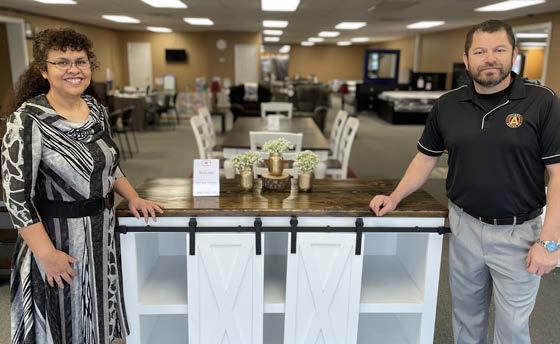
2 minute read
Home Is Where Your Story Begins
from March 2021
by Rev. Brenda Dedmon
Ihave a print hanging in my home that reads, “Home Is Where Your Story Begins.” Just recently, I have looked at that print and thought about memories of my home as a child. I have so many fun memories of my childhood. We did not have a lot of money, but I knew I was loved, and we had a lot of fun as a family.
Advertisement
My reflection as an adult makes me realize my life story did begin at home. I think my parents put into practice the Scripture in Proverbs 22:6: “Train up a child in the way he should go; even when he is old he will not depart from it.” Connection is the relationship you have with your child. When you take the time and make an investment in being intentional in building a relationship, you gain the power of influence over your child that cannot be matched by any other parenting effort. The following are a few suggestions I believe will get you started in the right direction: • Learn and speak your child’s love language. “The 5 Love Languages of Children” by Dr. Gary Chapman and Dr. Ross Campbell describes the ways children need to be loved. One example is if you constantly tell your child all the nicest things about them in passing, but their love language is Quality Time. If you are not having enough alone time with them, those nice things mean less. If you discover that inner language, you will have a greater impact. • Listen more than you speak. God gave us two ears and one mouth, so perhaps we need to listen more than we talk. Everyone wants to be heard, even children. We should value their thoughts, feelings, emotions, and their opinion. Children feel value when we listen to them actively. Actively listening is listening without thinking about what you are going to say. Train yourself and your children to pause
a few seconds between the end of one person’s sentence and the beginning of the other person. This gives time to absorb what is said and have empathy, and it gives an opportunity to understand their view and then respond. • Take an interest in your child’s interests. Your child’s favorite toys, hobbies, or interests are things they are strongly attached to. If you show no interest in
their favorites, they may think you do not like them. You do not have to love what they love, but you do have to show an interest. Allow them to talk about what they love and why they love it. This will help your child feel a sense of belonging and is the kind of bond needed for a relationship that leads to a positive parental influence.
As you put these ideas into your relationship with your child, you are building trust between you and your child. One day, your child will recognize how you did point them in the right direction, and they will realize that home is where their story did begin.
The Author Rev. Brenda Dedmon is the retired director of the Children’s Learning Center, First Baptist of Dalton. She is also an avid Bama, Roll Tide Fan!









